
In a move that has sent ripples through the tech industry, Google Cloud has revealed its latest artificial intelligence (AI) chip, Trillium. This sixth-generation custom AI processor is set to shake up the market, potentially putting competitors like Nvidia on high alert.
Trillium: A Powerhouse for AI Workloads
Trillium, first announced in May 2024, is designed to handle complex AI tasks with improved efficiency and performance. As part of Google Cloud's AI Hypercomputer infrastructure, it integrates seamlessly with other components to meet the growing demands of generative AI.
The new chip boasts impressive improvements over its predecessor, the TPU v5e:
- Over 4x boost in training performance
- Up to 3x increase in inference throughput
- Doubled HBM capacity and Interchip Interconnect bandwidth
These enhancements make Trillium particularly well-suited for large language models like Gemma 2 and Llama, as well as compute-intensive inference applications such as Stable Diffusion XL.
Efficiency and Scalability
Google has emphasized Trillium's focus on energy efficiency, claiming a 67% improvement compared to previous generations. This could be a game-changer in an industry where power consumption is a growing concern.
Scalability is another key feature of Trillium. The chip can connect up to 256 units in a single, high-bandwidth pod, expandable to thousands within Google's Jupiter data center network. This capability allows for near-linear scaling in extensive AI training tasks, maintaining consistent performance across hundreds of pods through Multislice software.
Benchmark Performance
In testing, Trillium has shown remarkable results:
- 4x increase in training speeds for models like Gemma 2-27b and Llama2-70B
- 3x greater throughput than TPU v5e for inference tasks
A3 Ultra VMs: Google's Answer to High-Performance GPUs
Alongside Trillium, Google announced the upcoming A3 Ultra VMs featuring Nvidia H200 Tensor Core GPUs. Set for preview this month, these virtual machines will offer Google Cloud customers a high-performance GPU option within the company's AI infrastructure.
Implications for the AI Chip Market
The introduction of Trillium and the imminent arrival of A3 Ultra VMs signal Google's strong push into the AI chip market. This move could potentially challenge Nvidia's dominance in the field, sparking increased competition and innovation.
As the AI arms race heats up, it's clear that Google is positioning itself as a major player in both chip development and cloud-based AI services. The tech giant's dual approach of custom AI chips and high-performance GPU offerings could reshape the landscape of AI computing in the coming years.